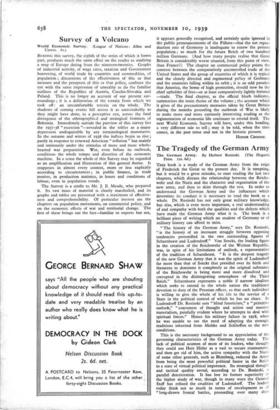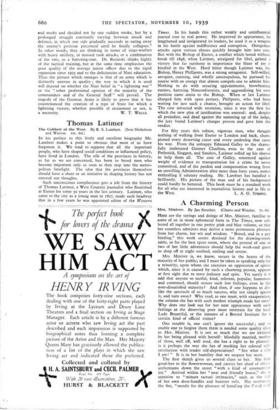The Tragedy of the German Army
THIS book is a study of the German Army from the reign of Frederick the Great to the present day. It is tempting, but it wou:d be a great mistake, to start reading the last two chapters, which discuss the relationship between the Reichs- wehr and the Nazis and the character and organisation of the new army, and then to skim through the rest. In order to understand the German Army and the influences which determine its conduct it is necessary to read the book as a whole. Dr. Rosinski has not only great military knowledge, but also, which is even more important, a real understanding of and sympathy with both the qualities and the defects which have made the German Army what it is. The book is a brilliant piece of writing which no student of Germany or of military history can afford to miss.
" The history of the German Army," says Dr. Rosinski, " is the history of an incessant struggle between opposing tendencies personified in the two outstanding figures of Scharnhorst and Ludendorff." Von Seeckt, the leading figure in the creation of the Reichswehr of the Weimar Republic, was, in spite of his limitations of outlook, a representative of the tradition of Scharnhorst. " It is the deepest tragedy of the new German Army that it was the spirit of Ludendorff far more than that of Seeckt that presided over its birth and threatens to dominate it completely as the original substance of the Reichswehr is being more and more dissolved and corrupted in the disintegrating atmosphere of the Third Reich." Scharnhorst represents a noble if narrow idealism which seeks to extend to the whole nation the traditional devotion to duty of the Prussian officer, so that each individual is willing to give the whole of his life to the service of a State in the political control of which he has no share. In Ludendorff Dr. Rosinski sees " blind fanaticism," a " primitive outlook," " coarseness of thought and action and massive materialism, painfully evident where he attempts to deal with spiritual forces." Hence his military failure in 1918, when he was unable to see the need of adapting the strategic traditions inherited from Moltke and Schlieffen to the new conditions.
This is the necessary background to an appreciation of the governing characteristics of the German Army today. The lack of political acumen of most of its leaders, who thought they could use Herr Hitler as a tool to secure rearmament. and then get rid of him, the active sympathy with the Nazis of some other generals, such as Blomberg, reduced the Army from being the most powerful political factor in the Reich to a state of virtual political impotence. Its strategical thought and tactical quality reveal, according to Dr. Rosinski, a parallel deterioration. It has lost its former superiority in the higher study of war, though in many ways the General Staff has refined the crudities of Ludendorff. The leaders today think not so much in terms of envelopment as of " long-drawn frontal battles, proceeding over many days
and weeks and decided not by one sudden stroke, but by a prolonged struggle constantly varying between attack and defence, in which one side gradually succeeds in eating away the enemy's position piecemeal until he finally collapses." In other words, they are thinking in terms of siege-warfare with heavy artillery, or massed tank attacks, or a combination of the two, as a battering-ram. Dr. Rosinski thinks highly of the tactical training, but at the same time emphasises the poor quality of the average junior officer due to the rapid expansion since 1935 and to the deficiencies of Nazi education. Thus the picture which emerges is that of an army which is distinctly uneven in quality ; the way in which it is used will depend on whether the Nazi belief in " a lightning war " or the " sober professional opinion of the majority of the commanders and of the General Staff " will prevail. The tragedy of the German Army is likely to prove that it has countenanced the creation of a type of State for which a lightning victory, whether possible of attainment or not, is





































 Previous page
Previous page